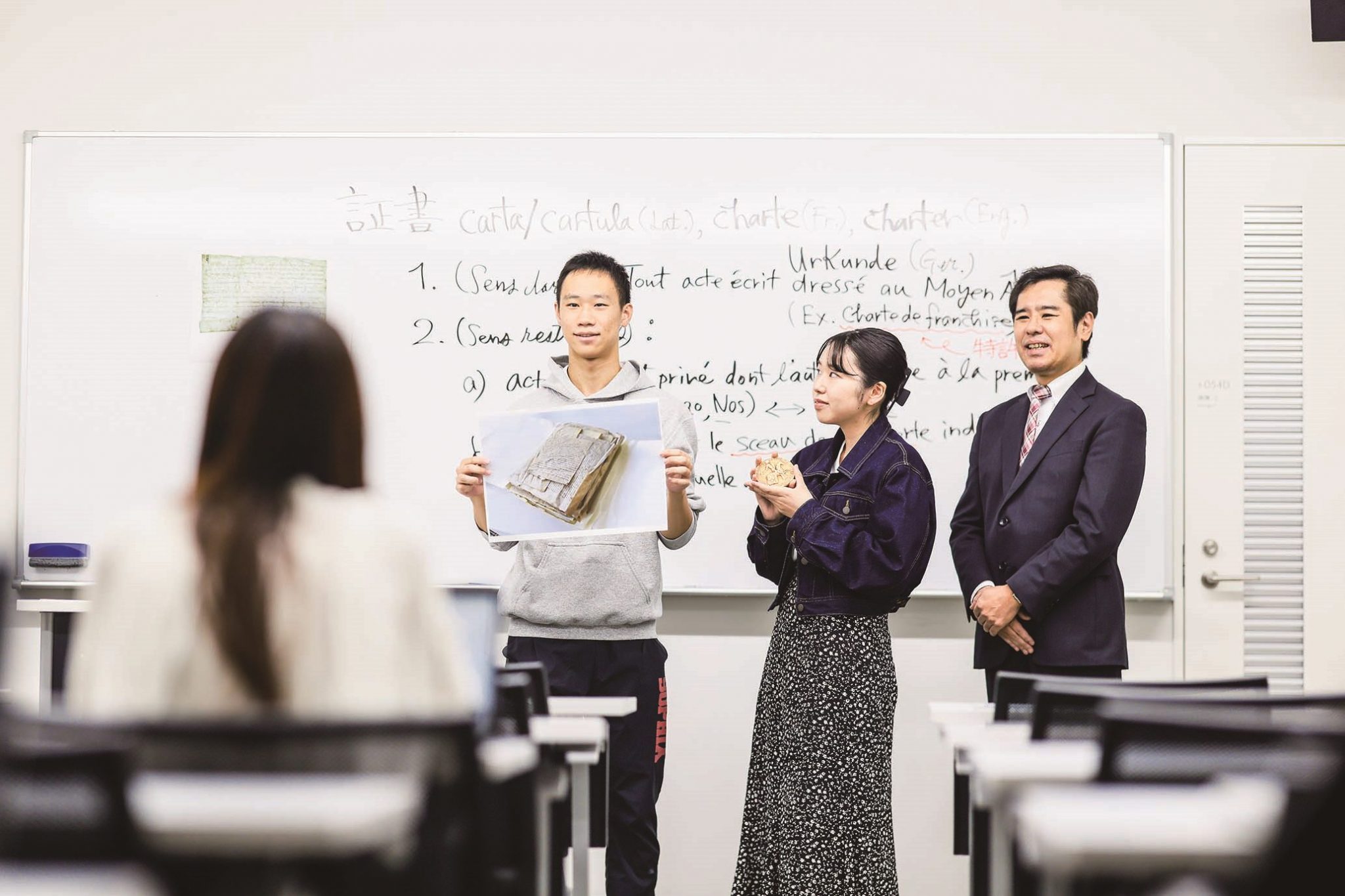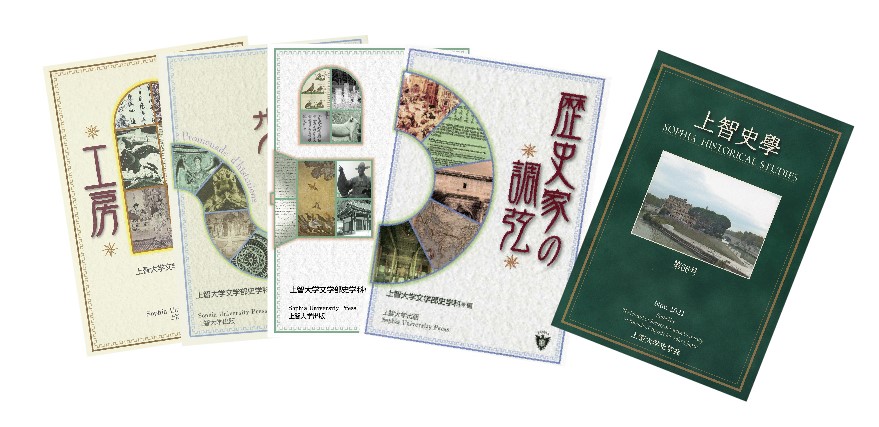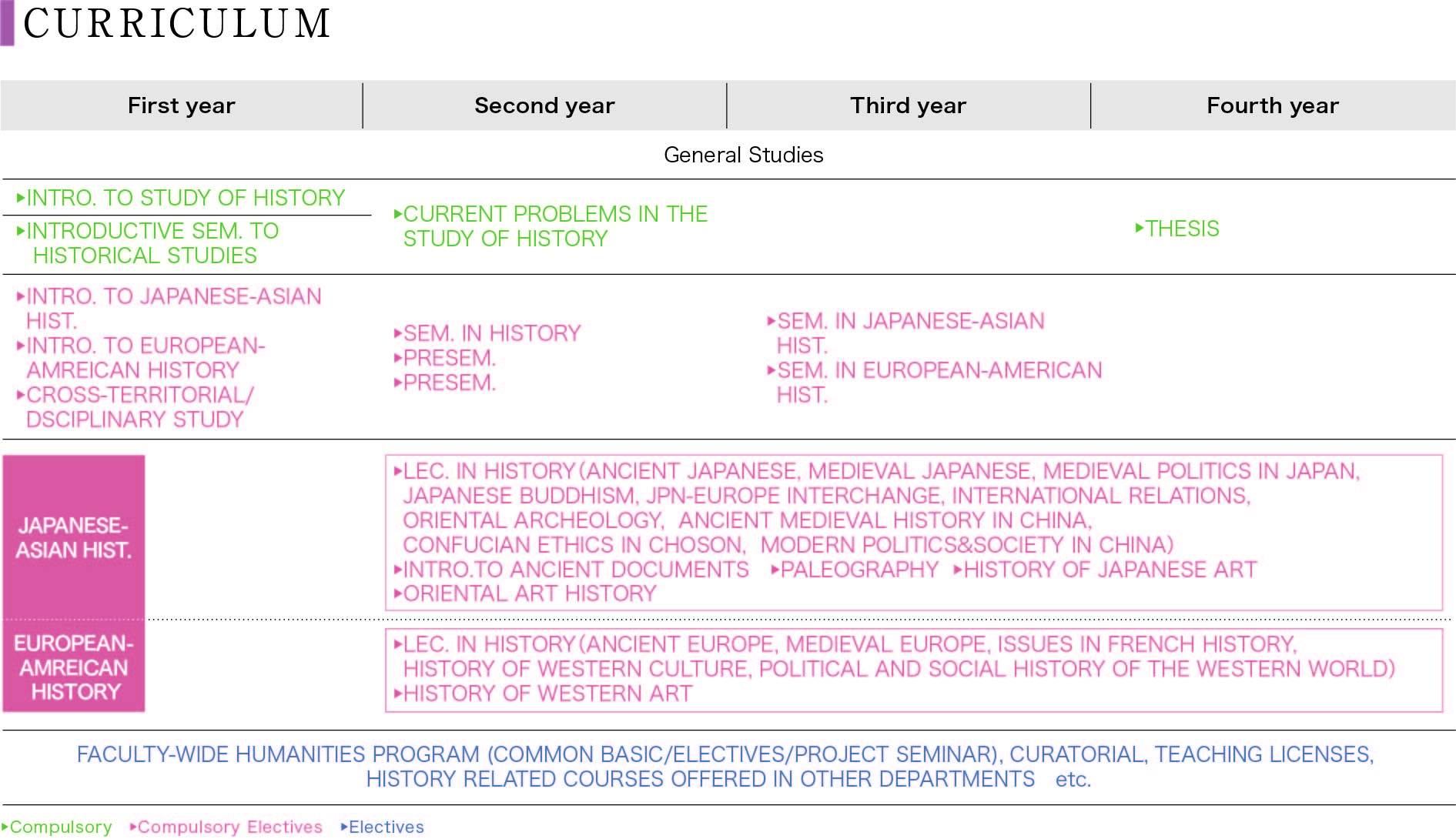Department of History


Department Features
History is the study of “learning from the past, understanding the present, and guiding the future” through the process of evaluating and analyzing data from the past, historical documents and determining historical facts. First, we focus on developing perception for the truth and the ability to identify problems without prejudice or bias, by the practice of delving into the primary sources and the accumulation of existing prior research. Next, we build up for the output of acquired knowledge with clear logic and objectivity, to actively participate in solving the problems posed. An extensive knowledge that transcends the time and deep understandings of society nurtured through the historical research enables our students to make a change in global society with an international perspective and a pluralistic historical approach.
Publishing faculty research to the public

We regularly publish the latest research discoveries of our faculty members in a collection of essays called the Historians Series. The Historical Society of Sophia University, of which the Department of History is the parent organization, publishes an annual journal, “Sophia Historical Studies,” which also publishes innovative essays by graduate students.
Curriculum
The Department of History has two majors, “Asian and Japanese History” and “European and American History,” which are further subdivided by period: Ancient, Medieval, Early Modern, and Modern.
In the first year, students learn the basics of historical research through courses such as Introduction to the above two fields, Introduction to Transregional History and Adjacent Studies, Introduction to Historical Research, and Introductory Seminar in Historical Studies. It is also a period for finding one’s own interests in a wide range of areas.
In the second year, students are to choose the pre-seminars (History Liberal Arts Seminar and Reading Seminar) subdivided by field and period of their choice to learn specialized study methods.
From the third year, students acquire analytical and reflective skills in specialized seminars under the supervision of their respective advisors.
as of 2022
* Please refer to the syllabus for more information on the courses.
Course Examples
- Current Problems in History
Each year, the program will focus on a different theme, such as “Myth and Lore,” “The Relationship between History and Narrative,” or “The Frontiers of Sensory and Emotional History,” and students will learn about issues in contemporary history through interdisciplinary lectures based on the latest research in multiple fields.
- Introduction to European-American History III
This course examines beliefs and ideas that transcend national borders, the movement and exchange of people, the contributions to international commerce made by groups of people displaced from their home countries and their backgrounds, and reexamines the historical picture of early modern Europe from the perspective of people’s connections and trust formation.
- History of Oriental Art
In this course, students will study the society, history, religion, and cultural exchange of the time through the art of the ancient Orient. We will specifically examine archaeological sites and artifacts from West Asia, Egypt, and Central Asia. Students will also learn about the preservation, collection, and exhibition of historical heritage.
- Cross-Territorial/ Disciplinary Study III
In this course we trace the significance of “history” as an embryo of human culture, and the formation and progress of the discipline that studies and depicts it in relation to each period and region. Based on the knowledge gained through this process, students will also consider the ideal nature of modern historical studies.
- Introduction to Ancient Documents
Students will learn the basics of deciphering ancient documents, which are essential for the study of Japanese history. Students will read a variety of ancient documents from ancient times to the modern era to learn writing styles and words, cursive and running script of Chinese characters, variant characters, abbreviations, variant kana, etc.
- Modern Politics & Society in the West
As an introduction to the study of the history of emotions, this course provides an overview of its significance and research methods. We will also focus on “affective politics” in modern Germany in specific terms, and review and discuss its texts. Lectures may be given in English, German, or Japanese.
Available Teaching Licenses and Subjects
- First Category Teaching license for Junior High School (Social Studies)
- First Category Teaching license for High School (Geography and History, Civics)
Curatorial courses are available.
Educational Objectives and Policies
-
To cultivate the ability to conduct rigorous research and closely examine various events and social phenomena, as well as the ability to evaluate society and the times in a multidimensional and comprehensive manner through the study of the theories and methods of history
-
To become a person who can understand the historical origins of the problems of human society by exploring the past, delivering their findings to society in order to tackle the current problems, and provide guidelines for the future.
-
The Department aims to nurture individuals who can contribute to society by acquiring the ability to critically evaluate modern society captured through its historical context rather than solely focusing on the current events, and by cultivating a multidimensional historical awareness and an international perspective that will serve as a foundation for multicultural conviviality. Students will have acquired the following qualities by graduation, and students who fulfill the following graduation requirements are recognized as having acquired these abilities and knowledge and are awarded a degree.
- the ability to gain historical insight into various social phenomena from a broad perspective
- the ability to identify problems in line with existing research
- the ability to accurately decipher various historical documents and to research and analyze historical facts
- the ability to construct a certain historical image from research results and to accurately express and deliver it
-
The curriculum is organized in line with the Diploma Policy, so that students can start from broad studies to highly specialized research.
- In the first year, students learn the basic theories and methods of history (“Introduction to Research” and “Introductory Exercises”) and acquire a wide range of basic knowledge in each field (“Overview” of various kinds).
- In the second year, students are required to decide their majors, and are expected to learn the latest research, specialized knowledge, techniques, and thinking skills (Lectures) through studying the important research and original historical materials in their respective fields (“Liberal Arts Seminar” and “Reading Seminar”).
- In the third year, students cultivate the ability to accurately read and understand technical books and historical sources written in the original languages and develop research skills through presentations and discussions (various “exercises”).
- In the fourth year, as the culmination of their studies, students are required to discover and pursue problems on their own and acquire the ability to express and communicate these problems logically and objectively (graduation thesis).
-
History is the study of the past to gain a deeper understanding of the present and to provide a guidance for the future. Therefore, we accept students who has:
- a broad interest and desire for knowledge about various social events and their historical backgrounds
- Original ideas that are not bound by the conventional theories.
- Patience to peruse the historical documents and to read them objectively, and the logical thinking ability to understand the context.
- have the ability to construct one’s own arguments theoretically and present them to others
Faculty Members
Shinzo KAWAMURA Professor
Yuji SASAGAWA Professor
Aki NAKAGAWA Professor
Eri NAKAMURA Associate Professor
